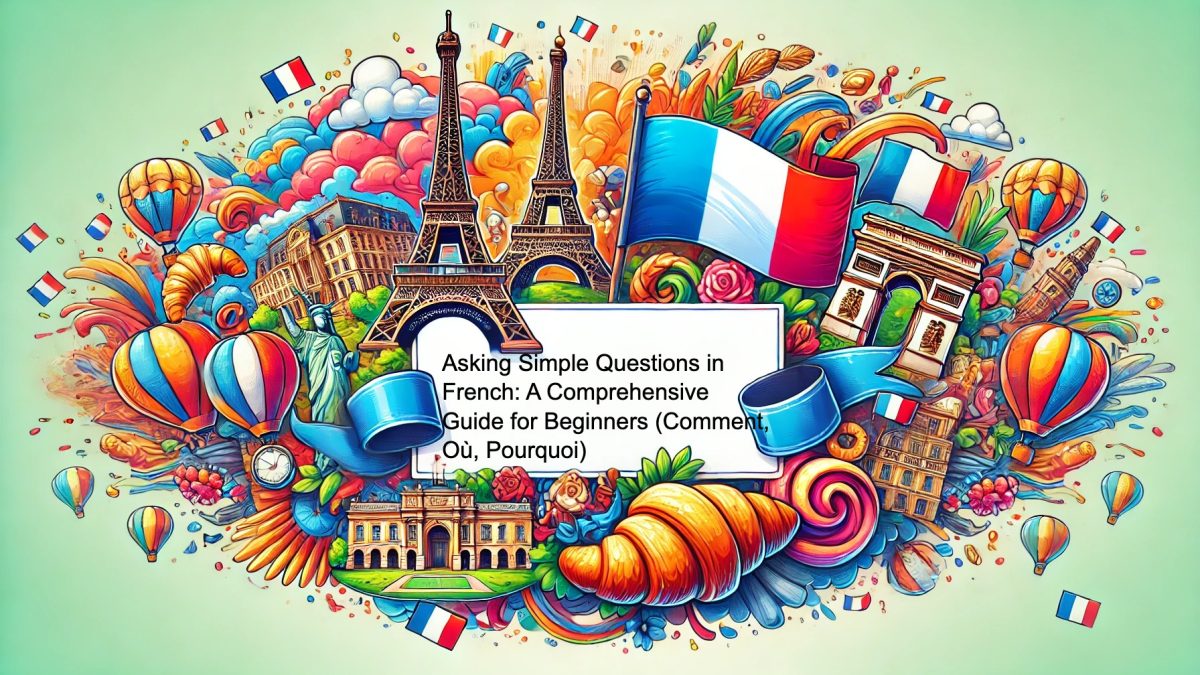
Understanding Basic Prepositions of Time in French: Le Matin, L’après-midi, Le Soir
August 11, 2024
Using “C’est” in French
August 11, 2024Asking Simple Questions in French: A Comprehensive Guide for Beginners (Comment, Où, Pourquoi)
Asking questions is a fundamental part of learning any language, especially when you are just starting out. For beginners at the A1 level in French, mastering the basic question words such as “Comment” (How), “Où” (Where), and “Pourquoi” (Why) is essential for effective communication. These simple question words allow you to gather information, clarify doubts, and engage in everyday conversations. In this guide, we will explore how to form and use these basic French questions, provide numerous examples, and offer tips on avoiding common mistakes.
The Importance of Asking Questions
In any language, asking questions is key to interacting with others, obtaining information, and deepening your understanding of the world around you. In French, there are several ways to ask questions, depending on the formality of the situation and the information you seek. Understanding how to properly use “Comment,” “Où,” and “Pourquoi” will greatly enhance your ability to converse in French.
1. Comment – How
“Comment” is used to ask questions about the manner or way in which something is done. It is equivalent to “How” in English and is essential for inquiring about methods, states, and conditions.
Structure and Usage of “Comment”
- To Ask About Methods or Processes:
- Comment + verb + subject?
- Example: Comment fais-tu cela? (How do you do that?)
- To Ask About Someone’s Well-being:
- Comment + verb (être) + subject?
- Example: Comment allez-vous? (How are you?)
- To Ask for Clarification or Explanation:
- Comment ça se passe?
- Example: Comment ça se passe à l’école? (How is school going?)
Examples of “Comment”
- Asking About Well-being:
- Comment ça va? (How are you?)
- Comment vas-tu aujourd’hui? (How are you today?)
- Inquiring About Methods:
- Comment est-ce que tu fais du pain? (How do you make bread?)
- Comment puis-je aller à la gare? (How can I get to the train station?)
- Requesting Clarification:
- Comment ça s’écrit? (How is that written?)
- Comment ça marche? (How does that work?)
2. Où – Where
“Où” is used to ask questions about location or position. It translates to “Where” in English and is crucial for navigating, finding places, and understanding the location of people or things.
Structure and Usage of “Où”
- To Ask About the Location of a Place or Object:
- Où + verb + subject?
- Example: Où est la bibliothèque? (Where is the library?)
- To Inquire About Someone’s Whereabouts:
- Où + verb + subject?
- Example: Où sont les enfants? (Where are the children?)
- To Ask About a Destination:
- Où vas-tu?
- Example: Où vas-tu ce soir? (Where are you going tonight?)
Examples of “Où”
- Asking About Locations:
- Où habites-tu? (Where do you live?)
- Où est la pharmacie? (Where is the pharmacy?)
- Inquiring About Destinations:
- Où vas-tu en vacances? (Where are you going on vacation?)
- Où allez-vous après le travail? (Where are you going after work?)
- Finding Objects or People:
- Où as-tu mis mes clés? (Where did you put my keys?)
- Où est mon téléphone? (Where is my phone?)
3. Pourquoi – Why
“Pourquoi” is used to ask about reasons or causes. It translates to “Why” in English and is essential for understanding motivations, explanations, and reasons behind actions or events.
Structure and Usage of “Pourquoi”
- To Ask About Reasons or Explanations:
- Pourquoi + verb + subject?
- Example: Pourquoi es-tu en retard? (Why are you late?)
- To Inquire About Purpose or Cause:
- Pourquoi + action?
- Example: Pourquoi fais-tu cela? (Why are you doing that?)
- To Express Curiosity or Confusion:
- Pourquoi + verb + subject?
- Example: Pourquoi est-ce qu’il pleut aujourd’hui? (Why is it raining today?)
Examples of “Pourquoi”
- Asking About Reasons:
- Pourquoi veux-tu apprendre le français? (Why do you want to learn French?)
- Pourquoi es-tu triste? (Why are you sad?)
- Inquiring About Causes:
- Pourquoi le ciel est-il bleu? (Why is the sky blue?)
- Pourquoi ne viens-tu pas avec nous? (Why aren’t you coming with us?)
- Seeking Explanations:
- Pourquoi est-ce si difficile? (Why is it so difficult?)
- Pourquoi as-tu fait cela? (Why did you do that?)
Combining Question Words
In French, you can also combine question words with other elements to form more complex questions. This is especially useful when you need to ask about more than one aspect of a situation.
Examples of Combined Questions
- How and Where:
- Comment puis-je aller à Paris et où dois-je changer de train? (How can I get to Paris and where do I need to change trains?)
- Where and Why:
- Où est-il parti et pourquoi n’a-t-il rien dit? (Where did he go and why didn’t he say anything?)
- How and Why:
- Comment as-tu fait cela et pourquoi? (How did you do that and why?)
Common Mistakes and Tips
- Incorrect Word Order: In French, the word order in questions is usually different from English. Be mindful of placing the verb before the subject.
- Incorrect: Où la bibliothèque est?
- Correct: Où est la bibliothèque?
- Overusing “Est-ce que”: While “Est-ce que” is useful, it’s not always necessary, especially in more informal questions.
- Example: Comment ça va? is often preferred over Comment est-ce que ça va?
- Pronunciation Practice: Make sure to practice the pronunciation of “Comment,” “Où,” and “Pourquoi,” as these words are fundamental in French conversations.
- Example: “Comment” should sound like “koh-mah,” and “Pourquoi” like “poo-rkwah.”
- Using the Right Question Word: Ensure that you’re using the correct question word for the information you’re seeking.
- Example: Use Où for places, not Pourquoi.
Practice Exercises
Here are some exercises to help you practice asking simple questions in French:
1. Fill in the blanks with the correct question word (Comment, Où, Pourquoi):
- _ est la gare? (Where is the train station?)
- _ fais-tu pour apprendre le français? (How do you learn French?)
- _ es-tu fatigué? (Why are you tired?) Answers:
- Où est la gare?
- Comment fais-tu pour apprendre le français?
- Pourquoi es-tu fatigué?
2. Translate the following questions into French:
- Where are you going?
- How are you?
- Why is he sad? Answers:
- Où vas-tu?
- Comment ça va?
- Pourquoi est-il triste?
3. Form a question based on the answer:
- Answer: Je vais à Paris.
- Question: _? (Where are you going?)
- Answer: Parce que je veux voir la Tour Eiffel.
- Question: _? (Why do you want to go to Paris?)
- Answer: J’apprends le français avec un professeur.
- Question: _? (How are you learning French?) Answers:
- Où vas-tu?
- Pourquoi veux-tu aller à Paris?
- Comment apprends-tu le français?
Cultural Insights: Asking Questions in French
- Formality: In French culture, it’s important to consider the level of formality when asking questions. Using “vous” instead of “tu” and choosing the appropriate question form can make your questions more polite.
- Example: Comment allez-vous? (formal) vs. Comment ça va? (informal)
- Directness: French speakers may be more direct when asking questions, but it’s still important to be polite, especially in formal situations.
- Example: Pourquoi pensez-vous cela? (Why do you think that?) is direct but polite.
- Social Etiquette: In social settings, it’s common to start a conversation with questions like “Comment ça va?” or “Où habitez-vous?” to show interest and engage politely.
Conclusion
Mastering the basic question words “Comment,” “Où,” and “Pourquoi” in French is a crucial step for any beginner. These words will allow you to ask questions, seek information, and engage in meaningful conversations. By practicing their usage, familiarizing yourself with common structures, and being aware of cultural nuances, you’ll enhance your ability to communicate effectively in French.
Remember, asking questions is not just about the words you use but also about how you use them. Practice regularly, be mindful of formality, and don’t hesitate to ask questions in real-life situations. Bonne chance (good luck) on your journey to mastering French!

